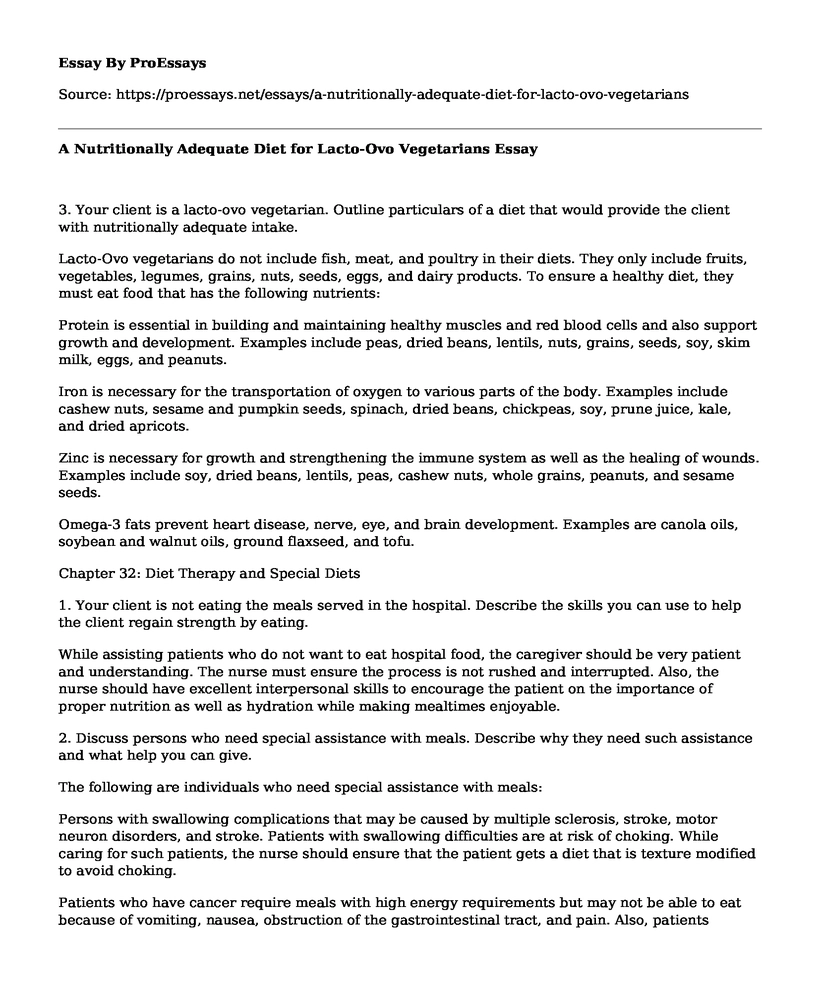3. Your client is a lacto-ovo vegetarian. Outline particulars of a diet that would provide the client with nutritionally adequate intake.
Lacto-Ovo vegetarians do not include fish, meat, and poultry in their diets. They only include fruits, vegetables, legumes, grains, nuts, seeds, eggs, and dairy products. To ensure a healthy diet, they must eat food that has the following nutrients:
Protein is essential in building and maintaining healthy muscles and red blood cells and also support growth and development. Examples include peas, dried beans, lentils, nuts, grains, seeds, soy, skim milk, eggs, and peanuts.
Iron is necessary for the transportation of oxygen to various parts of the body. Examples include cashew nuts, sesame and pumpkin seeds, spinach, dried beans, chickpeas, soy, prune juice, kale, and dried apricots.
Zinc is necessary for growth and strengthening the immune system as well as the healing of wounds. Examples include soy, dried beans, lentils, peas, cashew nuts, whole grains, peanuts, and sesame seeds.
Omega-3 fats prevent heart disease, nerve, eye, and brain development. Examples are canola oils, soybean and walnut oils, ground flaxseed, and tofu.
Chapter 32: Diet Therapy and Special Diets
1. Your client is not eating the meals served in the hospital. Describe the skills you can use to help the client regain strength by eating.
While assisting patients who do not want to eat hospital food, the caregiver should be very patient and understanding. The nurse must ensure the process is not rushed and interrupted. Also, the nurse should have excellent interpersonal skills to encourage the patient on the importance of proper nutrition as well as hydration while making mealtimes enjoyable.
2. Discuss persons who need special assistance with meals. Describe why they need such assistance and what help you can give.
The following are individuals who need special assistance with meals:
Persons with swallowing complications that may be caused by multiple sclerosis, stroke, motor neuron disorders, and stroke. Patients with swallowing difficulties are at risk of choking. While caring for such patients, the nurse should ensure that the patient gets a diet that is texture modified to avoid choking.
Patients who have cancer require meals with high energy requirements but may not be able to eat because of vomiting, nausea, obstruction of the gastrointestinal tract, and pain. Also, patients undergoing chemotherapy may have a change in taste, thereby affecting their appetite. As such, cancer patients may require assistance during mealtimes. To assist such patients, the nurse should ask them what food they prefer, and at the same time, encourage them to eat or drink as required. The nurse should not press the patient to eat but encourage them to take in small amounts more frequently.
Patients who have undergone surgery may be unwilling to eat due to nausea and pain. Such patients need extra energy to help in wound healing. In caring for such patients, the nurse should provide a relaxed environment with no interruptions as well as providing necessary equipment such as cutlery with easy to grip handles.
Other patients, such as the elderly who have visual impairments, learning disabilities, or dementia, may need help during meals. To assist such patients, the nurses should encourage family members familiar to the patient to help them eat.
Chapter 88: Digestive disorders
2. List factors that are known to aggravate digestive conditions. Explain how you can use these factors in instructing a client how to prevent problems with hiatal hernia.
Factors that aggravate digestive conditions:
-Eating a low fiber diet
-Inadequate exercise
-Consuming excess dairy products
-Stress
-Intake of antacids that contain aluminum or calcium
-Pregnancy
-Excessive use of laxatives that weaken bowel muscles over time
To prevent hiatal hernia, the nurse should encourage the patient to eat foods with high fiber and low acid such as grains, skim milk with low fat, green beans, and carrots. The patient should reduce the intake of dairy products, wear loose clothing in case of pregnancy, avoid unnecessary consumption of laxatives, and reduce stress levels.
3. Alcohol is a known toxin of the liver. Develop a teaching project for high school students discussing the health hazards of alcohol.
Teaching project
Questions for discussion
How does alcohol affect a person's judgment and body? What effects does alcohol have on the body?
Is alcohol mentally and physically addictive? What are the symptoms of alcohol addiction? What effects does alcohol have on people's lives and those around them? How do people treat and deal with alcoholism?
What cultural aspects encourage alcohol consumption? For instance, adverts, TV shows, celebrities.
Activities
Identify and analyze images from advertisements and the media and compare them with facts about alcohol. Recognize whether the images misrepresent drinking and how they manipulate viewers. How do the ads compare with known facts about alcohol?
Analyze critically the role that culture plays in alcohol consumption and examine various ways to cope with peer pressure relating to alcohol consumption.
Cite this page
A Nutritionally Adequate Diet for Lacto-Ovo Vegetarians. (2023, Jan 25). Retrieved from https://proessays.net/essays/a-nutritionally-adequate-diet-for-lacto-ovo-vegetarians
If you are the original author of this essay and no longer wish to have it published on the ProEssays website, please click below to request its removal:
- Genetic Disease - Case Study Example
- Autoimmune Disease: Myasthenia Gravis Paper Example
- Healthcare Access Essay Example
- Research Paper on Pacific Tsunami Warning System: Ensuring Safety for 26 Member Countries
- NAON: Professional Development for Orthopaedic Nurses - Essay Sample
- Transforming US Healthcare: 4 Areas of Nursing Practice - Research Paper
- Paper Sample on Common Cold: Causes, Prevention & Impact







